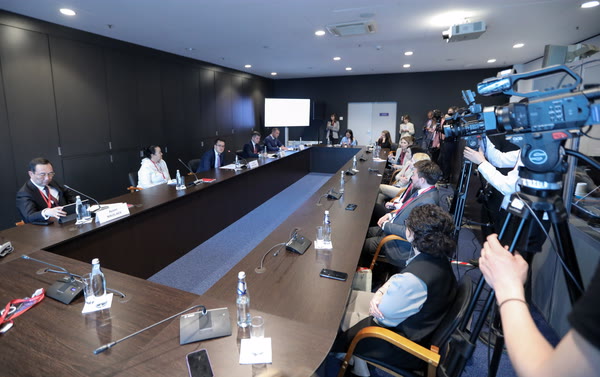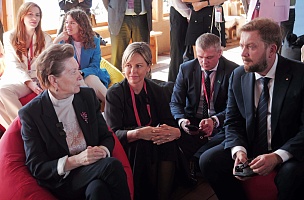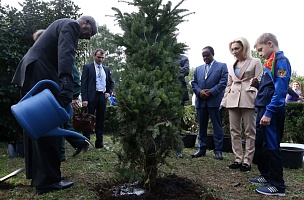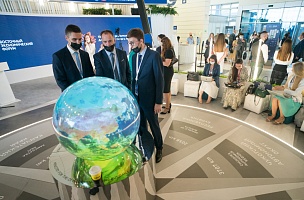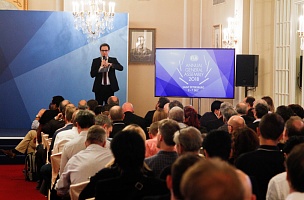KEY CONCLUSIONS
Cultural heritage of Russian people allows us to defend interests of the country
“Import substitution in the creative industry has become very important today. We must create our own modern competitive cinema, our own brands and multimedia art so that our spiritual bonds, which are under serious pressure, do not dissolve but, on the contrary, become stronger. Every nation has its own epic heritage. Unfortunately, it is on the verge of extinction for some nations, not only for small but also for large ones. If the whole country succeeds in this issue, then interest in Russia will markedly increase,” Aysen Nikolaev, Head of Sakha Republic (Yakutia).
“We are confident that every step to preserve historical and cultural heritage, develop folk art and our traditional values is a state and national matter,” Lilia Gumerova, Chairman of the Committee on Science, Education and Culture, Federation Council of the Federal Assembly of the Russian Federation; Chairman, Permanent Commission on Science and Education, Interparliamentary Assembly of Member Nations of the Commonwealth of Independent States.
Reaching the global level
“Today, it is relevant to preserve languages through national theatres, especially for small nations. There is also an issue of participation in global projects: federal and international. It is important to maintain a balance of language preservation and healthy cultural globalization that allows us to reach a completely different level or, in other words, do not stew in our own juice,” Sergey Emelyanov, Director, National Drama Theater of Russia (Alexandrinsky Theater).
“Our classical, national art has reached a high level. At this point, we need to decide whether we keep it at such a good local level or we have ambitions to say that our art can be a soft power to promote interests of our country in the Arctic. As people with ambitions, we have chosen the second option. We believe that the Epos and Arts Centre of the Arctic will be a soft power along with economic and military powers,” Aysen Nikolaev, Head of Sakha Republic (Yakutia).
Culture of the peoples of Russia — a manual for other countries
“We expected Yakut movies to start winning the Oscars and the Cannes. But then sanctions have been imposed. [...] Many people living in the Arctic countries envy us and that development the national culture in the Republic of Sakha (Yakutia) has,” Aysen Nikolaev, Head of Sakha Republic (Yakutia).
“We have a lot to be proud of and boast about. Aysen [Nikolaev, Head of Sakha Republic (Yakutia) — Ed.] has already said that Americans envy Yakutia, and I know that some approaches to the preservation of our intangible cultural heritage are a manual for others,” Sergey Emelyanov, Director, National Drama Theater of Russia (Alexandrinsky Theater).
PROBLEMS
There is a shortage of cultural workers in Russian towns
“According to experts, such facilities are short of 14 thousand specialists. Thanks to national projects, new cultural centres are being built even in countryside and small towns, but walls alone are unlikely to help us preserve our unique cultural heritage if there are no specialists there,” Lilia Gumerova, Chairman of the Committee on Science, Education and Culture, Federation Council of the Federal Assembly of the Russian Federation; Chairman, Permanent Commission on Science and Education, Interparliamentary Assembly of Member Nations of the Commonwealth of Independent States.
Folk crafts lose value due to mass low-quality replication
“It is necessary to protect producers since mass replication devalue the concept of traditional craft, authorship and traditions. Even the Gzhel is massively replicated without author’s consent. The first aspect is protection of authorship and conditions for monetization,” Irada Ayupova, Minister of Culture of the Republic of Tatarstan.
SOLUTIONS
Support programme of cultural workers
“We want to support our cultural workers with the help of the Zemsky Cultural Worker Programme. [...] The programme is set for 2023–2028. Its estimated cost is RUB 5.9 billion. This is a consolidated budget; it involves both regional and federal budgets. We are ready to report on this and outline solutions at the traditional meeting of the Chamber Council with the Prime Minister. We think it would greatly support cultural workers,” Lilia Gumerova, Chairman of the Committee on Science, Education and Culture, Federation Council of the Federal Assembly of the Russian Federation; Chairman, Permanent Commission on Science and Education, Interparliamentary Assembly of Member Nations of the Commonwealth of Independent States.
“We should probably create a national marketplace that will allow us to sell our products not only in the territory, but also around the world,” Irada Ayupova, Minister of Culture of the Republic of Tatarstan.
“Three all-Russian marketplaces are financed by the Presidential Fund for Cultural Initiatives to collect and place what people produce. There is also packaging, it matters but we pay disastrously little attention to it,” Roman Karmanov, Chief Executive Officer, Presidential Fund for Cultural Initiatives.
Sanctions will increase the interest of Russians in their culture, it is necessary to offer a product
“There is a positive trend of turning inward. Unfortunately, many citizens, especially in Central Russia, have never been to Yakutia, Tatarstan, Petropavlovsk-Kamchatsky and Vladivostok. [...] As part of the promotion campaign of the Association of National Theatres and National Regions, we had the idea of creating the first series of documentaries called Theatrical Map of Russia. The Internet Development Institute supported this application. We will make films about national theatres, starting in Yakutia. [...] We are also planning to film in Tatarstan, Bashkiria and Karelia this year. The project will probably be released in November on the most popular streaming platforms and will attract Russians to travel around our country,” Aleksey Lebedev, Director, Russian Seasons.
“The Ysyakh [Yakut summer holiday — Ed.] has turned into a holiday of all the nations who live in Yakutia. [...] I am glad we made it the largest national holiday of Russia in 2019. 205 thousand people visited this holiday in two days back then. This year there will be even more for sure,” Aysen Nikolaev, Head of Sakha Republic (Yakutia).
“Today, we have an opportunity to see the country and, most importantly, to introduce Russian regions to the highest achievements of our country in the art sphere,” Sergey Emelyanov, Director, National Drama Theater of Russia (Alexandrinsky Theater).
Law on Intangible Cultural Heritage will protect the sphere and allow it to develop faster
“As for legislative support and consolidation of the concept of intangible cultural heritage in the legal framework, these attempts lasted more than twelve years. Many Russian territories, there are nine of them, have adopted their own similar laws. We were instructed to develop such a law. [...] This law has been prepared. Its authoring team was headed by the Chairman of the Federation Council Valentina Matviyenko and the Chairman of the State Duma Vyacheslav Volodin. The law entitled On the Intangible Cultural Heritage of the Russian Federation has been submitted to the State Duma. We have successfully passed the first reading in the State Duma. It will be symbolic if the law is adopted this year,” Lilia Gumerova, Chairman of the Committee on Science, Education and Culture, Federation Council of the Federal Assembly of the Russian Federation; Chairman, Permanent Commission on Science and Education, Interparliamentary Assembly of Member Nations of the Commonwealth of Independent States.
For more information, visit the Roscongress Foundation’s Information and Analytical System at roscongress.org/en


